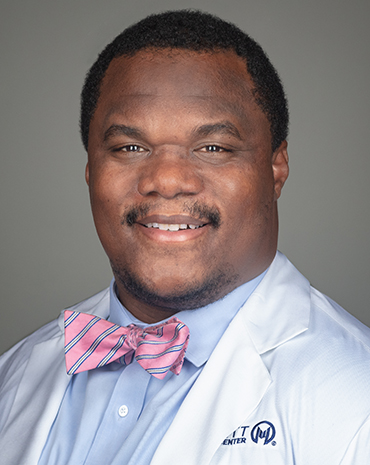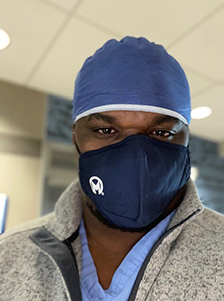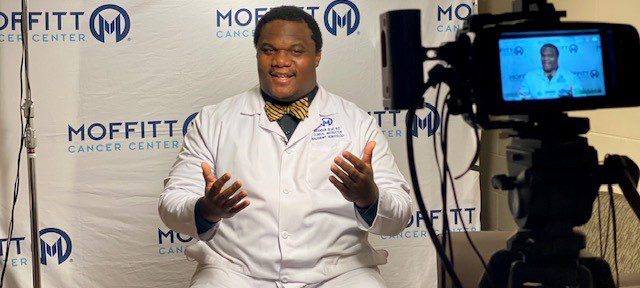Dr. Brandon Blue is Leading By Example
As a 16-year-old, Dr. Brandon Blue worked at a nursing home near his house in south St. Petersburg. What was originally supposed to be a part-time job actually fueled his interest in medicine and health care.
Today he is 34 and an assistant member in Moffitt Cancer Center’s Department of Malignant Hematology.

“That job in the nursing home exposed me to nurses and doctors and sick people,” Blue said. “I told myself, ‘I can do this!’ I’m personable and good at math and science. I knew I had to find something that aligned with that.”
So Blue took his love of people, science and data to heart. He attended Florida State University and enrolled in the pre-med program.
“Becoming a doctor happens in steps,” Blue laughed. “I knew I wanted to be a doctor, but I didn’t know what type. In medical school I shadowed several different doctors and that’s when I came across oncology. I saw patients get cured from a potentially fatal disease and saw the relationship cancer patients have with their oncologist.”
That relationship, Blue said, is unlike any other patient-doctor relationship he’s seen.
“I wanted to do something to make a difference and for me, oncology is the best way to do that,” he said. “In this role you have to empathize and be personable. You’re seeing someone at the most vulnerable part of their life. Everyone is scared of cancer — it doesn’t matter their profession or race.”
When he learned about blood cancers, Blue said he knew he wanted to focus there because he felt he could do the most to help.
“I had a special interest in this area because people get sick so quickly with lymphoma and leukemia, for example,” he said. “The problem with malignant hematology is that there is no screening like a mammogram or colonoscopy to find signs of cancer. So, when a patient gets to us most of the time it’s an advanced disease that was discovered by accident.”
Blue has used his knowledge of science and his bedside manner at Moffitt since he started here in 2018. As a Black doctor practicing medicine in his hometown, he takes a special interest in showing youth from the entire racial spectrum that anything is possible if you focus and work toward your goal.

Dr. Blue at Moffitt Cancer Center.
“I never saw a Black doctor growing up,” Blue said. “I saw my first Black doctor when I was in college. That’s why I give talks whenever I can. I’ve spoken in churches and at parks in St. Petersburg. Kids are very visual and they see sports stars and entertainers all the time, so they see those careers as options to succeed. There’s nothing wrong with that but my goal is to say, ‘Hey, I’m here. I was literally where you were 10 years ago. Now I’m a doctor. You can do this, too.’ ”
Convincing students to pursue a career in math or the sciences can be a challenge, but Blue is determined to rise to the occasion.
“I want to show people from my community that there are people from where they are who have made it to a successful adulthood,” Blue said. “No one wants to be a nerd or be ridiculed, but I talk about how awesome it is to be an A student. Being smart is cool.”
That was instilled in him by his mother, who was a teacher in the Pinellas County School District for 30 years. While she never pushed him to become a doctor, Blue said it was his mother who always kept him on track and focused on his future.
“I was lucky to have my parents support me,” Blue said. “And I’m lucky to be back near my hometown and have my family close.”
His retired mother is busy being a proud grandmother to his two young children. Part of that role includes child care, he said.
“My wife and I are both doctors, she works in neonatal health care, so our schedules can get pretty crazy,” he said. “You would think our dinner conversations would be fascinating, but we mostly discuss the alphabet and the kids’ obsession with ‘Frozen.’ ”




